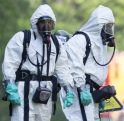Raccoon Tests Positive for Rabies in East Macon Neighborhood
Posted January 19, 2023 by Michael Hokanson
A raccoon in the Lakeside Hills neighborhood of Macon has tested positive for rabies. The Macon-Bibb County Health Department’s Environmental Health staff reminds all residents to avoid contact with wild animals and ensure pets are properly vaccinated against rabies.
The raccoon was picked up by Macon-Bibb County Animal Welfare for testing after the animal attacked a pet dog on a residential property in East Macon. While there has been no recorded human exposure to the infected raccoon, the pet involved in the incident will be monitored for 45 days to ensure the dog is not infected. The exposed animal had received rabies vaccination, and Environmental Health Specialists have advised the owner to have the pet revaccinated.
Though attacks by may be rare, this incident is a reminder that several species of wild animals in our area can carry rabies, including raccoons, foxes and bats. Rabies is a potentially deadly virus that is primarily spread by infected animals.
Macon-Bibb County Health Department Environmental Health encourages you to follow these recommendations to protect yourself, your family and your pets from rabies:
- Avoid contact with animals you don’t know.
- Make sure your pets receive the proper immunizations and that vaccination is up to date. Dogs and cats should get rabies vaccines after 12 weeks of age, followed by a booster shot within one year and vaccination every 1-3 years depending on veterinary recommendation and vaccine used.
- Never handle, feed or unintentionally attract wild animals with open garbage cans or by leaving pet food out at night.
- Never adopt wild animals or bring them into your home. Do not try to nurse sick animals to health. Call animal control or a properly licensed animal rescue agency for assistance.
- Teach children to never handle unfamiliar animals, wild or domestic, even if they appear friendly.
Rabies is a viral disease that can be carried by mammals and transmitted through an infected animal’s saliva through a bite or scratch. In rare cases, the virus can spread from infectious material coming in contact with a mucus membrane like eyes or nose, or an open wound. Once it enters the body, rabies attacks the brain causing encephalopathy and death.
Symptoms of rabies in humans include fever, headache and tiredness. As the illness progresses, the exposed person may experience anxiety, insomnia, confusion, excitement, hallucinations, agitation, paralysis, difficulty swallowing, hypersalivation and hydrophobia (fear of water). Death usually occurs within days of the appearance of advanced symptoms.
While there is no effective treatment for rabies once symptoms of the illness appear, rabies can be prevented in humans if medical care and post-exposure prophylaxis is provided soon after exposure to the virus. Post-exposure treatment requires a series of shots, but left untreated, rabies is always fatal.
Report bites or scratches from any animal that could potentially be unvaccinated against rabies to a healthcare provider and your county’s Environmental Health office immediately. To learn more about public health’s role in rabies control, visit NCHD52.org/Rabies.


 Contact Us
Contact Us Locations
Locations Job Openings at North Central Health District
Job Openings at North Central Health District Internships
Internships Board of Health
Board of Health Cost and Insurance
Cost and Insurance Privacy Policy
Privacy Policy Teens & Adults
Teens & Adults For Children
For Children Other Programs
Other Programs County Environmental Health Offices
County Environmental Health Offices Chemical Hazards
Chemical Hazards Tourist Accommodations
Tourist Accommodations Food Service
Food Service Rabies Control
Rabies Control Lead Poisoning Prevention
Lead Poisoning Prevention Body Art
Body Art Land Use
Land Use Swimming Pool Program
Swimming Pool Program Water Testing for Private Wells
Water Testing for Private Wells Environmental Health Complaints
Environmental Health Complaints Georgia Food Recall Alerts
Georgia Food Recall Alerts Personal & Family Preparedness
Personal & Family Preparedness Emergency Preparedness for Functional & Access Needs
Emergency Preparedness for Functional & Access Needs Severe Weather Preparedness
Severe Weather Preparedness Emergency Preparedness Training
Emergency Preparedness Training Medical Reserve Corps
Medical Reserve Corps Regional Healthcare Coalitions
Regional Healthcare Coalitions Strategic National Stockpile/Medical Countermeasures
Strategic National Stockpile/Medical Countermeasures